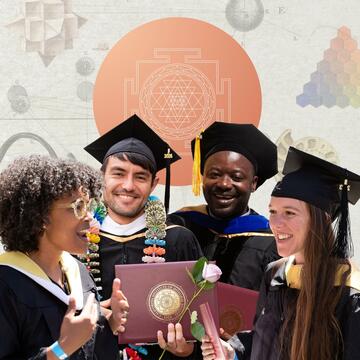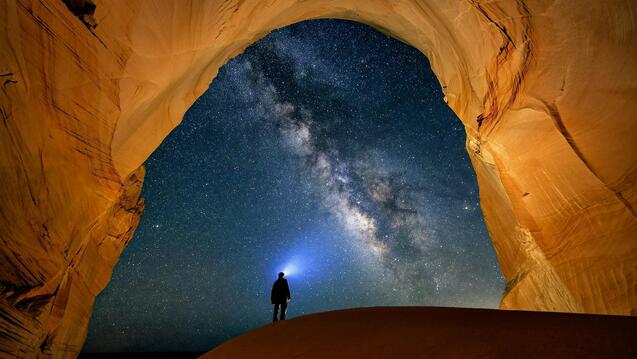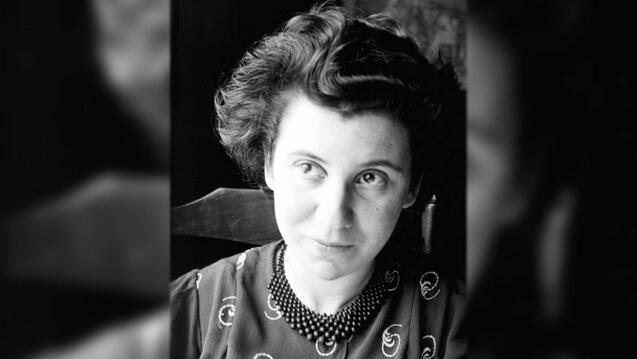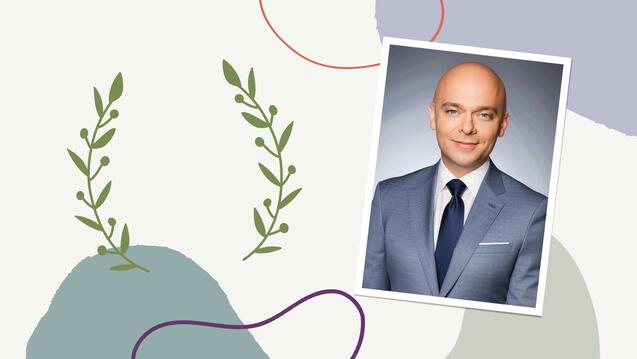CIIS Professor Emeritus and founding director of Philosophy, Cosmology, and Consciousness Richard Tarnas returned for his beloved annual lecture exploring the deeper currents of our time.
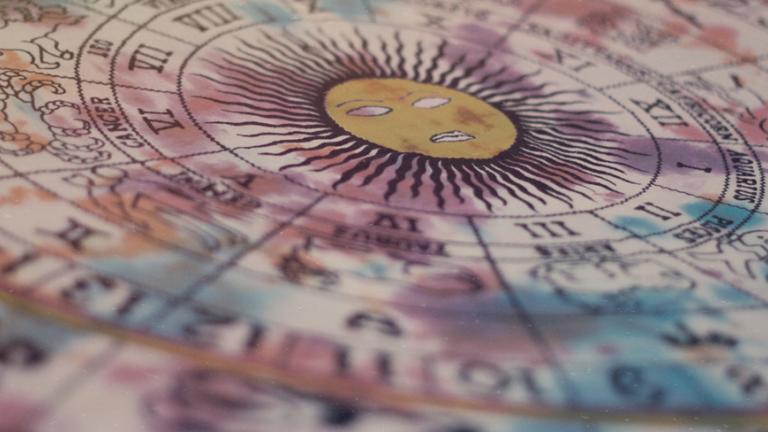
The Activism in Her Stars
Counseling astrologer, writer, and CIIS alumna, Chani Nicholas talks about the path that lead her to CIIS and her social justice approach to astrology
Chani Nicholas, a CIIS alumna, has been a counseling astrologer for more than 20 years. She believes the personal is political, art is magic, and all should have access to the healing practices that we need. Writing horoscopes is her way of creating a free, communal, online space where healing can occur.
Her work has been featured in Rolling Stone, Oprah Magazine, The New York Times, the Los Angeles Times, NPR, The Atlantic, Teen Vogue, and more. Chani's first book, You Were Born For This: Astrology for Radical Self-Acceptance, is a New York Times best seller.
Tell us about you and CIIS. What brought you and what did you take away?
CIIS came about at a time when I was hungering to learn more and to committing to myself in a way that I hadn’t been able to do earlier in life. When I first got to thinking about going to CIIS, I had done enough healing to get into a part of my brain that was able to think and want to learn. Until then, I had been surviving in so many ways that I wasn’t able to sink into and develop another part of me besides my survival skills. I had a negative belief about my intelligence; I didn’t believe I was smart enough.
My father left school when he was 13—he had to work and support his family—and no one on my mom’s side had higher education. I grew up in a small town that was alternative, so nobody talked about going to university. Instead of thinking about university, I felt urgency to figure out how to get work, make money and pay bills.
Then, I got to a place in my life where I was feeling a little more stable about myself, and I had friends who were going to CIIS. I started looking online, and CIIS was like a far-off dream. I didn’t think I was smart enough, I had no money, I’m horrible at paperwork and applying for loans and all that, but by the skin of my teeth I got everything together and got in. It was terrifying to walk in the first day of school.
And then when I got there, I found that the BA Completion program is such a unique program, where it’s diverse in terms of age and background and where we’d all come from, and I was like, “Oh, what was I so scared about?” The teachers I had there are so incredibly gifted at what they do; they are doing the thing that they are supposed to do in life. The majority of professors that I had were living out their purpose in such an extraordinary way that it allowed me to accept so much of myself.
It was a big turning point for me. Ultimately, people who were there gave me permission to do astrology in a way that I didn’t before that know I wanted. The skill and the compassion that they brought to their work was exactly what I needed. They held me to a high standard intellectually and held me with such care and compassion that we were allowed to learn, and that is a rare combination. My experience at CIIS was incredibly profound.
Let's talk about how astrology became your life path. How did you decide it was what you wanted to do?
Chani Nicholas: I was introduced to astrology when I was 12. My step-grandmother bought my family a reading that was helpful for me to understand my new family. When you’re struggling as a young person, and you have a lot of discordant family structures, anything that helps to understand the psychology of the different members of your families can be a great tool. That’s what astrology was in that moment for me. It helped me to understand myself and my new family members in a way that I hadn’t before; it helped me to contextualize our relationships and ourselves individually.
You’re talking about relationships. It sounds like astrology is a way to see other people as well as yourself and to have compassion.
Astrology is a tool that helps me access my compassion . When I’m doing a reading, I see somebody’s life through their eyes instead of feeling like I’m separate from them. When I see their chart, it immediately puts me into the role of companion; it’s like somebody lets me into their home. I’m speaking to what I witness, and they can tell me if it resonates with them or not. The more it resonates with them, the more I understand how they see, and when you’ve been granted access to somebody’s story and life, it’s such an incredible privilege.
It sounds like you’re eliciting their wisdom.
Absolutely. I think if astrology is doing its job, it should create a container, much like counseling does, for the person’s own wisdom and their own ways of healing that they need. You create the space for that to come forward. I don’t believe that I know anything about anybody that they don’t know; I don’t believe I know what’s right for anybody; but there is wisdom in the system itself, there is a technology built into it that allows, if it’s done with care, for a person to reach for some self-acceptance. I think that in that there can be a kind of instantaneous healing, a release on some level, an opening to some deeper self-acceptance.
Is there a relationship between your Judaism and your work in astrology?
Yes, there’s a relationship between Judaism, astrology and the rest of my life, and they intersect in ways that I wasn’t cognizant of when I was younger. I didn’t know that people like Ibn Ezra were astrologers, and I didn’t know that in my own lineage there were astrologers and the two systems came out of the same time frame and the same part of the world, at least the system that I’m studying.
There’s also the fact that, as Jews, we celebrate the new moon. It is an important gateway into ancient cultures that we’re focused on the cycles of nature and that we were reliant and in relationship with all of creation in different ways than modern life is. As human beings, we started historically by worshiping the movements of nature as holy, and the light of the sun, the journey of the sun, the waning and waxing of the moon. The journey of it was something that humans all over the world were in connection with, and that is at the roots, I believe, of all religious practice. It is something that we can search back and find, those strands of being in relationship with the cycles of the month, and the cycles of the year, and the cycles of life.
This raises a question: You talked about astronomy, which is a science; is there an objective reality to astrology? We tend to think about astrology in the way we think about tarot, a system of symbols that help us construct a narrative of our experience. But you seem to be saying there’s also an objective reality that, like it or not or even know it or not, we really are going to be influenced by where the stars were when we were born—is that right?
That’s the theory of astrology. I’m not invested in convincing skeptics to “believe in” in astrology—it’s just a tool that’s been profoundly healing for me personally and for the people I work with. I work with it because it works. And the basis of it is that we are marked by the imprint that is in the sky the moment we took our first breath. We inhale, and we become the amulet of that moment in time. Astrology is about the quality of that moment of time in our life—we are a constellation of that moment—and how we live it out, how we can find that moment in time’s potential.
Astrology is a tool that helps me access my compassion . When I’m doing a reading, I see somebody’s life through their eyes instead of feeling like I’m separate from them. When I see their chart, it immediately puts me into the role of companion; it’s like somebody lets me into their home. I’m speaking to what I witness, and they can tell me if it resonates with them or not. The more it resonates with them, the more I understand how they see, and when you’ve been granted access to somebody’s story and life, it’s such an incredible privilege.
Could you talk about the relationship between your work in astrology and your work for social justice?
Going back to your earlier question about being Jewish and doing astrology, I feel Heschel’s 1 way of thinking and being within religion aligns to how I feel my responsibility and the responsibility of whatever profession we have and whatever we do: How can this serve not only my personal liberation but the collective one as well? If I’m not taking what I’ve been given and using it for that purpose, I’m not that interested in it. If there’s not an ability for using it for both the pain of the past and the injustice of the past and the present, then it doesn’t hold my interest for long.
The birth chart paints a picture of where the stars were when someone was born, but aren’t there other factors that shape people, such as class or race? Some of what becomes of us is not about our personality but the social arrangements into which we were born. How do you merge those understandings?
Well, that’s present in ancient astrological paths; there are astrologers from a very long time ago who said, “Look, you have to understand the context of a person’s life. Two people can have the same astrology chart; one can be born in privilege and one can be born into an oppressive situation. The astrology chart speaks to the qualities of their life, what they’ll have difficulty with, what they’ll have ease with, but you have to look at it within the context of the structures within which one is born. For example, if someone is given a blessing in their chart in terms of an auspicious planetary placement in their birth chart, how they use it is going to be different from how another person is going to be able to use it, given societal privileges and context. That is a consideration when giving a one-to-one reading.
And when I’m writing online for people in general, I am always thinking about the moment that we’re living in and the historical significance of it. That’s woven into everything I write. Sometimes I’m explicit about it; sometimes I’m covert about it. But always I’m wanting to talk about this moment: how we ended up here and what does it mean that we are here?
You said CIIS teachers impressed you by living out their best life and finding their purpose. It seems as though that is what you’re about trying to help people to do when you read for them.
Absolutely. That is what astrology is good at doing. Astrology is not the solution to everything, but it does get to the core of what the meaning of our life is. If we’re younger and we’re doubting, or if we’re older and we haven’t quite nailed it yet, astrology can validate the hopes and dreams we have for ourselves. Sometimes, that is enough to help people accept themselves and go for it.
The more people are radically accepting of their life’s purpose, the more we get to the work of bringing about justice in whatever way we can, here on earth.
1Rabbi Abraham Joshua Heschel: “In a free society, some are guilty, but all are responsible.”
Related News
Barbara Morrill, CIIS Professor Emerita, explores the life of Jewish writer Etty Hillesum, who decried the brutality of the Nazi occupation of Amsterdam during World War II.
Associate Professor Christopher Walling receives the Gina Ogden Curatorial Scholarship for Integrative Approaches to Sex Research and Therapy from the Kinsey Institute at Indiana University
